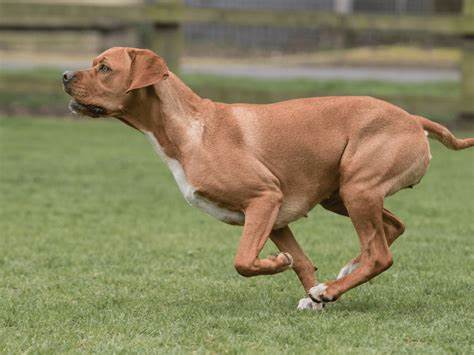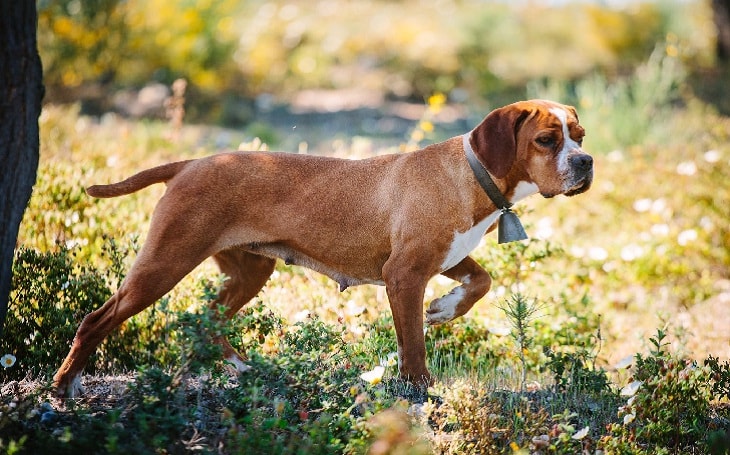
The Portuguese Pointer, or Perdigueiro Português, is one of the oldest pointing breeds in Europe. Its origins trace back to the 12th century, where it was developed in Portugal as a bird dog for falconry and later for working alongside hunters to locate and point game birds—especially the red-legged partridge.
The breed is thought to share ancestry with the Spanish Pointer and played a role in the development of the English Pointer in the 18th century. Despite modernization and crossbreeding trends, Portugal maintained the purity of this breed, and today, the Portuguese Pointer stands as a proud symbol of the country’s sporting dog history.
Although highly esteemed in its native country, the Portuguese Pointer is relatively rare outside of Portugal. However, as interest in versatile hunting breeds grows and more people seek loyal, trainable, and affectionate companions, the breed is steadily gaining recognition globally. It is recognized by the Fédération Cynologique Internationale (FCI) and various national clubs, and continues to build a small but passionate following in North America and Europe.
The Portuguese Pointer is a medium-sized, muscular, and elegant dog, built for endurance and precision in the field. Its short, dense coat and noble appearance give it a refined but athletic presence.
• Height: 20–22 inches (51–56 cm)
• Weight: 35–59 pounds (16–27 kg)
• Body: Square, compact, and well-proportioned
• Coat: Short, coarse, and dense with a velvety texture on the ears and face
• Color: Typically shades of yellow or light brown (fawn), often with white markings on the chest, face, or feet
• Head: Broad with a pronounced stop and well-defined muzzle
• Ears: Medium-sized, triangular, and set high, hanging close to the cheeks
• Tail: Thick at the base, tapering to a point; usually carried horizontally or slightly down
The breed is renowned for its gentle, affectionate, and people-oriented nature, making it not just a capable hunting dog but also a beloved family companion.
• Highly Affectionate: Forms deep bonds with family and is particularly attached to its owner
• Focused Hunter: Calm and methodical in the field, with a natural pointing instinct and soft mouth
• Good with Children and Other Dogs: Friendly and patient, though socialization is key
• Sensitive: Responds best to positive reinforcement and consistent training
• Moderately Energetic: Requires regular exercise but is calm indoors when mentally and physically satisfied

If you’re looking for a dog that balances hunting drive with gentleness, the Portuguese Pointer is an excellent choice. It’s especially appealing to:
• Hunters seeking a versatile and loyal field companion
• Families who want a dog that’s affectionate and gentle
• Dog sport enthusiasts interested in obedience, agility, or scent work
• Owners with experience managing intelligent and sensitive breeds
• Exercise: Needs daily physical activity and mental enrichment. Long walks, playtime, and structured activities are recommended.
• Training: Intelligent and eager to please but can be emotionally sensitive. Use gentle, positive methods.
• Grooming: Minimal coat care needed. A weekly brush and occasional bath suffice.
• Living Conditions: Does well in a house with a yard or active household. Needs close contact with its people and doesn't thrive when left alone for long periods.
• Diet: Feed high-quality food tailored to its activity level. Maintain a healthy weight to support its joints.
The Portuguese Pointer is generally a healthy and robust breed, thanks to careful breeding practices in Portugal. Still, it's essential to watch for:
• Hip dysplasia
• Ear infections (due to drooping ears)
• Eye issues (rare, but should be screened)
Routine vet checkups and an active lifestyle contribute to long-term wellness. The average lifespan is 12–14 years.

• English Pointer: More widely known and slightly more intense in the field; Portuguese Pointers are calmer and more affectionate.
• German Shorthaired Pointer: More versatile in rough terrain and water work, while the Portuguese Pointer is more specialized for dry terrain and partridge hunting.
• Vizsla or Weimaraner: All are affectionate and sensitive, but the Portuguese Pointer tends to be more reserved and focused during work.
This breed is an excellent fit for outdoorsy families, hobby hunters, or dog lovers seeking a medium-sized, affectionate companion. While not ideal for sedentary or absent owners, it thrives in an active home that values companionship and daily connection.
Because of its rarity outside Portugal, prospective owners should be prepared to work with reputable breeders or breed clubs. United Pet Club can assist with ethical breeder referrals, health screening advice, and resources for training and travel, especially for rare working breeds.